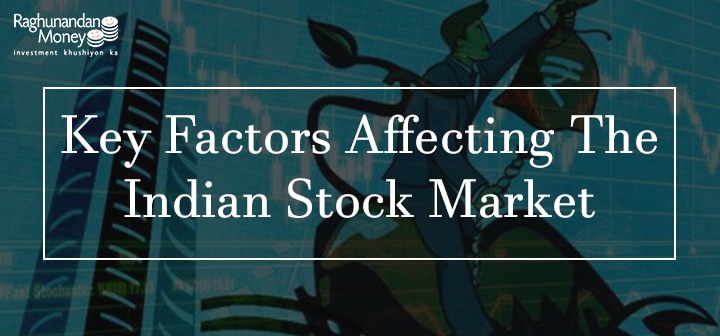The volatility in the stock prices is what makes investing risky for the majority of people out there. While the risk-takers move ahead and invest in the stock market, despite the volatility, the risk-averse people are the ones who avoid entering the market.
However, it is the market volatility that carries the essence of market returns. It is the market fluctuations that help in discovering the real prices of stocks. Investors who put their money into risky stocks are the ones ending up with higher returns. A rise in a stock’s price directly increases an investors’ net worth. It is the risk-taker investors who invest aggressively in the stock market with the objective of wealth creation in the long run.
The dynamic nature of the Indian stock market is driven by various internal factors which in turn contribute to the fluctuations in the stock prices. The key factors are discussed in detail in this blog.
Key Factors Affecting Stock Market Movements
External and internal factors both have a significant contribution to stock market fluctuations. Key external factors that affect the Indian stock market are as follows:
Government Policies
Government policies have a major impact on both the economy and businesses in the nation. The government is constantly implementing new policies keeping in mind the country’s economic conditions. Any change made in the policy can be profitable for the nation’s economy or can end up tightening the grip around. This surely affects the market movements For instance, if the government decides to increase the corporate taxes to be charged, the industry will be severely affected owing to the impact on its profits. As a result, the firm’s stock prices will fall.
Monetary & Regulatory Policies by RBI and SEBI
Reserve Bank of India (RBI) is an apex body for regulating our nation’s monetary policy. Any change in the repo and reverse repo rate affects the stock prices. A rise in the key rates reduces the banks’ liquidity and makes borrowing costlier in turn increasing the lending rates. Highly expensive borrowings make it difficult for the business community to service their debt obligations.
On the other hand, a dovish monetary policy followed by RBI causes banks to reduce their lending rates, in turn leading to credit expansion. This is seen as a positive step by investors and instigates growth.
Likewise, any changes in the trading and investment policies by SEBI impacts the performance of the shares listed on the stock exchanges.
Fluctuation in Exchange Rates
Indian currency’s exchange rate with respect to other currencies keeps on fluctuating. When the rupee hardens with respect to foreign currencies, Indian goods become expensive in the foreign markets. This largely affects companies who are involved in overseas operations and a dependent majorly on the exports for their business. The revenue from exports in such a scenario declines while the company’s stock prices fall in the domestic market. The opposite happens when the rupee softens with reference to foreign currencies. The stock prices of exporting firms’ rise in this case while that of the importers drop.
Inflation
Inflation is the rise in the prices of goods and services over a period of time. If the rate of inflation in the economy is high, it will discourage the investors regarding investments and long-term economic growth. The companies listed on the stock exchanges like NSE and BSE might end up postponing their investment and halting their production resulting in negative economic growth. The fall in the value of money also results in a fall in the value of savings. The stocks of various luxurious firms suffer as people are reluctant to invest in them. Thus, inflation affects both an individual’s purchasing power and investing power.
Natural Disasters
Natural disasters not only turn our world upside down but also create havoc in the stock market. The frequency and the severity of natural calamities like earthquakes, droughts; floods, etc not only result in human displacement but also end up leading to asset destruction. It affects a nation’s economic growth and pushes individuals to poverty affecting their consumption and investment pattern. The sales volume falls affecting the revenue of a company. As a result, the future cash flows fall and expansion activities come to a halt.
Bottom Line
Various factors affect the stock prices of companies. In order to be in a win-win situation, investors need to have a strong allocation strategy and should follow the same with discipline. The allocation strategy should be designed after understanding the various factors affecting the stock markets. This will also ensure that the investors make the right investment decision while opting for online stock trading.
About Author

Stock Trading Now trade in ₹9 Per Order or ₹ 999 Per Month Plans.
Future & Options Access F&O contracts with advanced tools for hedging and speculation.
Currency Trading Trade in major currency pairs and manage forex exposure efficiently.
Commodity Trading Diversify Trading with MCX & NCDEX by Trading in Gold, Silver, Base Metals, Energy, and Agri Products.
Margin Trading Funding Boost your buying power with upto 5X, Buy now Pay Later
Algo Trading Back test, Paper Trade your logic & Automate your strategies with low-latency APIs.
Trading View Leverage Trading View charts and indicators integrated into your trading platform.
Advanced Options Trading Execute multi-leg option strategies with precision and insights.
Stock Lending & Borrowing Earn passive income by lending stocks securely through SLB.
Foreign Portfolio Investment Enable NRIs and FPIs to invest in Indian markets with ease and compliance.
IPO Invest in upcoming IPOs online with real-time tracking and instant allotment updates.
Direct Mutual Funds 0% Commissions by investing in more than +3500 Direct Mutual Fund Scheme.
Corporate FDRs Earn fixed returns with low-risk investments in high-rated corporate fixed deposits.
Stocks SIPs Build long-term wealth with systematic investment plans in top-performing stocks.
Bonds & NCDs Access secure, fixed-income investments through government and corporate bond offerings.
Depository Services Safely hold and manage your securities with seamless Demat and DP services with CDSL.
Journey Tracing our growth and milestones over time.
Mission & Vision Guided by purpose, driven by long-term vision.
Why RMoney Platform Smart, reliable platform for all investors' needs.
Management Experienced leadership driving strategic financial excellence.
Credentials Certified expertise with trusted industry recognition.
Press Release Latest company news, updates, and announcements.
Testimonials Real client stories sharing their success journeys.
7 Reasons to Invest Top benefits that make investing with us smart.
SEBI Registered Research Trusted insights backed by SEBI-compliant research.
Our Technology Advanced tools enabling efficient online trading.
Calculators Access a suite of smart tools to plan trades, margins, and returns effectively.
Margin Calculator Instantly check margin requirements for intraday and delivery trades.
MTF Calculator Calculate MTF funding cost upfront to ensure full transparency before placing a trade.
Brokerage Calculator Know your exact brokerage charges before placing any trade.
Market Place Explore curated investment products and trading tools in one convenient hub.
RMoney Gyan Enhance your market knowledge with expert blogs, videos, and tutorials.
Performance Tracker Track our research performance with full transparency using our performance tracker.
Feedback Share your suggestions or concerns to help us improve your experience.
Downloads Access important forms, software, and documents in one place.
Locate Us Find the nearest RMoney branch or service center quickly.
Escalation Matrix Resolve issues faster with our structured support escalation process.
Back Office Log in to view trade reports, ledger, and portfolio statements anytime.
Account Modification Update personal or bank details linked to your trading account.
Fund Transfer Transfer funds instantly online with quick limit updation to your trading account.
Bank Details View our registered bank account details for seamless transactions by NEFT, RTGS or IMPS.
How to Apply IPO Step-by-step guide to apply for IPOs using your trading account.
RMoney Quick Mobile App Trade on-the-go with our all-in-one mobile trading app.
RMoney Quick login Quickly access your trading account through the RMoney Quick web-based trading.
RMoney Rocket Web Version Experience powerful web-based trading with advanced tools for algo traders.
RMoney Rocket Mobile Version Trade anytime, anywhere with our feature-rich mobile trading platform.




















